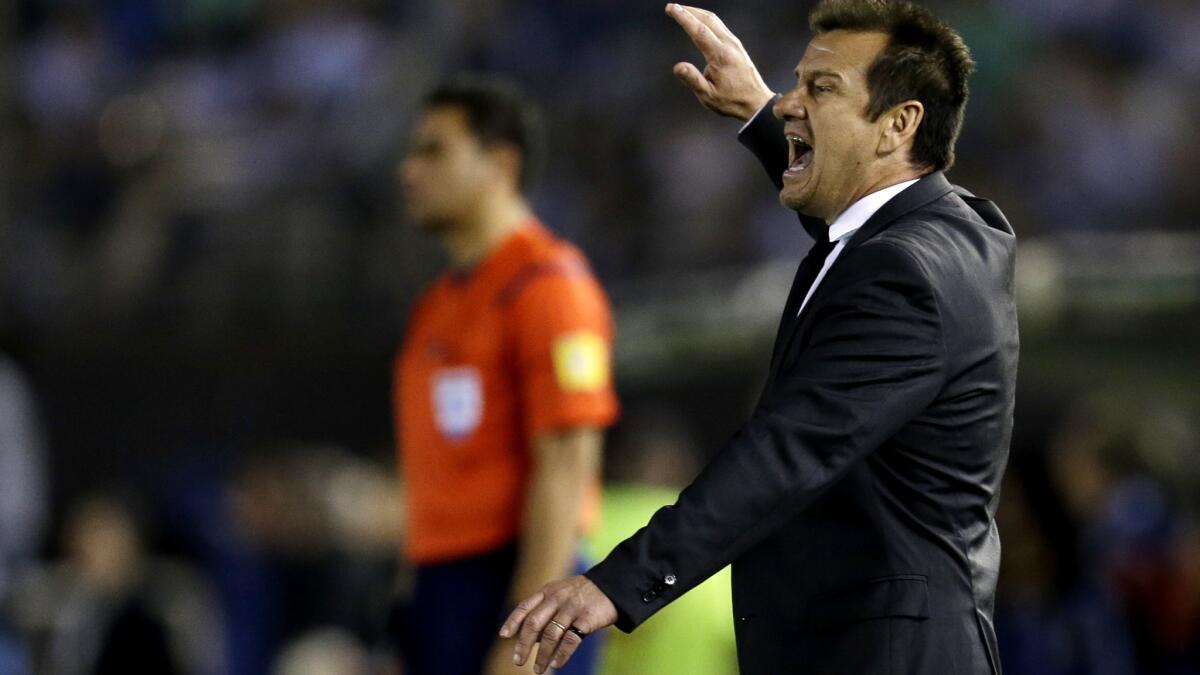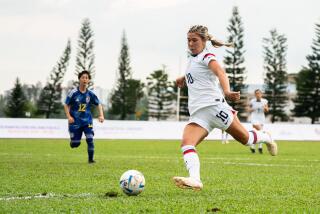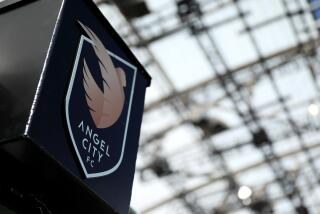Soccer’s Dunga and Brazil are looking forward to a reunion with the Rose Bowl

The last time Carlos Caetano Bledorn Verri — better-known as Dunga — participated in a major international soccer game at the Rose Bowl, he delivered the penalty kick that gave Brazil its fourth World Cup title.
That was 22 years ago. Yet Dunga, in his second stint as coach of the Brazilian national team, still gets emotional talking about that day.
“I remember many things,” he said in Spanish after a training session at the StubHub Center last week. “In Brazil, we always say penalty kicks — the president should take them, not the players, because it’s a big responsibility.
“It’s you against the world. The whole planet is watching. And you can’t ask for help from anyone.”
Dunga and Brazil are heading back to the Rose Bowl next weekend to meet Ecuador in the Copa America Centenario, a 16-team, 10-city tournament that kicks off Friday in Santa Clara with the U.S. playing fourth-ranked Colombia. The field also includes Argentina, the world’s top-ranked team according to FIFA, and Chile, the reigning Copa America champion and the No. 3 team in the FIFA poll.
Most of the pressure will be on Argentina, which may be without a healthy Lionel Messi after the five-time world player of the year was injured Friday in a friendly with Honduras. With Messi, Argentina lost in the finals of the 2014 World Cup and 2015 Copa America, and it has hasn’t won a senior international trophy in 23 years, the longest drought in its history.
The tournament is likely down one star already because Uruguay’s Luis Suarez, Messi’s Barcelona teammate, is doubtful with a hamstring injury. Suarez, who led European players with 59 goals in all competitions this season, is expected to join Uruguay next week but is unlikely to play until the quarterfinals, should his team advance.
Dunga’s Brazil, meanwhile, is missing the third jewel from Barcelona’s crown, but that’s by choice because Neymar was left off the Copa team to prepare for August’s Olympic tournament, which will be played in Brazil. As a result, Dunga will begin a rebuilding phase Saturday when he returns to the Rose Bowl, where he also won a silver medal before a crowd of more than 101,000 in the 1984 Olympics.
“Hopefully, now Brazil gets back to winning here,” he said.
Making that happen could be a lot more difficult than converting a World Cup-winning penalty kick, though. In addition to Neymar, Dunga left defenders Thiago Silva and David Luiz and midfielder Oscar off his roster, then lost midfielder Douglas Costa to a left thigh injury. In their absence, the average age of the players on the Brazilian roster drops to 25 — including seven players who are age-eligible for the Olympics, an under-23 competition.
For that, Dunga is making neither excuses nor apologies. His team still includes three holdovers from the World Cup squad, in addition to Kaka, who is aging but is still a former world player of the year.
“Obviously we’d like to have Neymar here, but this is a top team,” Dunga said. “Some of them are very young, but they have quality. This is a unique opportunity for these players to show they deserve to be on the first team.”
One of those getting an opportunity is Gabriel, a 19-year-old forward from suburban Sao Paulo who already is being hailed as the next Neymar. Gabriel, who is playing in Brazil for Santos, the club that made both Pele and Neymar famous, will be making his international debut in this tournament, just as a teenaged Neymar made his debut on U.S. soil in 2010.
“While it’s a difficult [choice],” Dunga told the Brazilian media this spring, “the Olympics Games are a priority for me. It’s the one title we’ve never won, and we’re playing at home.”
But even if the Copa America has turned into something of an Olympic audition for Dunga, Brazil should have no trouble advancing out of group play. And its team, ranked seventh in the world, is talented and worldly enough to make a long run in the tournament after that.
After all, things have changed a lot since Dunga won the World Cup in Pasadena. Half the men on that roster played for domestic teams in Brazil, for example, while the one Dunga will coach Saturday includes 17 men who are playing internationally. And that’s just the tip of a huge wave that saw Brazil send more than 725 players to professional leagues in 52 foreign countries this year, ranging from England and Spain to Albania and the Faroe Islands, according to the website Eurorivals.net.
“Tomorrow is different than today,” Dunga said with a shrug. “When generations change, many things change. Before, you had two players in Europe, now almost all are overseas.
“You have players of all national teams everywhere, so it’s very level. The aspect of training, mentality, competitions —, everyone is very experienced.”
Twitter: @kbaxter11







